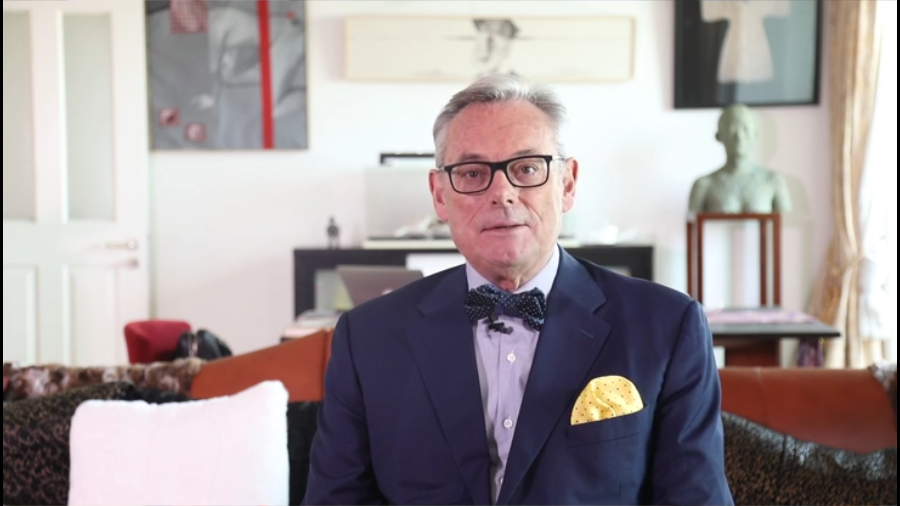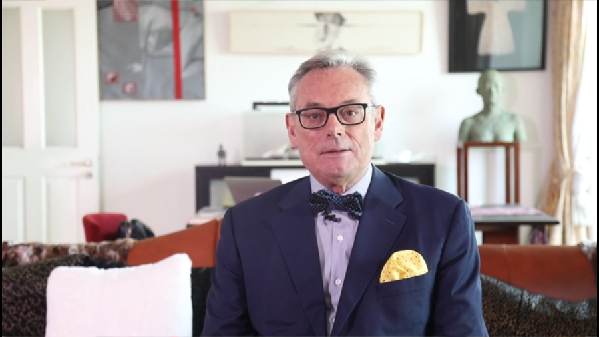Beijing strong romantic attachment
Editor’s note: This year marks the 40th anniversary of China’s reform and opening-up, and huge changes have been made in Beijing, capital of China, over the past 40 years. We have invited 40 foreign experts to participate in a series of interviews named “New Era, New Insight” jointly hosted by GMW.cn(The official website of Guangming Daily) and the Information Office of Beijing Municipality and share their “Beijing Stories”.

My name's Geoff Raby, I'm an Australian I've lived in Beijing for 12 years I came here as the Australian ambassador to China at the beginning of 2007 and when my posting finish in the end of 2011.
I decided that I would make a Beijing my home. And so I now live here and have lived here continuously for 12 years,I've set up my own consultancy business directed mainly at assisting Australian companies to understand the China market to position themselves strategically and to build relationships and that's been a very successful business.
At the same time because of my China’s experience and knowledge. I have been on the board of directors of several major streaming companies that are listed on the stock exchange.
At the same time because of my China’s experience and knowledge. I have been on the board of directors of several major streaming companies that are listed on the exchange? stock exchange.
It's quite interesting that when I finished being ambassador, people ask me, why didn't you come home? I was a diplomat for 27years. Why did you make Beijing your home? And I said well in the 1950s or 1960s Australians would often make London their home if they lived overseas, and then in the eighties and nineties, the first choice was usually New York but I said that now with the changing in the world, the weight of economic power that's moved decisively to east Asia particularly China and astray and living abroad should live in either Beijing or Shanghai.
I was very comfortable in Beijing. Having a come here first in 1986, as first secretary in the Australian embassy. At that time my colleague was Kevin Rudd I was first secretary economic, Kevin was first secretary political, and we were good colleagues and I came without a Chinese background.
My training is actually all in economics I have a PHD in economics and I'd worked for many years in Canberra, helping them prime minister Bob Hawke, understand the developments in the Chinese economy, following the introduction of the reform and open door policies of 40 years ago.
And so it was appropriate that I came, but I didn't have any Chinese and the first thing, Kevin Rudd who eventually became Australia's prime minister asked me what was my Chinese name. And I didn't have one and so my first afternoon in Beijing in the office and embassy Kevin sat down with me with Chinese dictionary, his Chinese being excellent and he worked through the dictionary to find a name for me, which was both phonetic reflecting my English name which is Jeffrey Raby in food but also had some particular meanings and if my tones are ok, it's something like this “芮捷锐”and Kevin like it because he said it was pointing thrusting. I'm not sure if that was a compliment, but that's been the name I've kept in China for 32 years and it's got too many jokes in the characters but I do know how to write it if I'm putting the task.
So Beijing in those days was obviously very different than it is today. I think many foreigners in those days had a really strong romantic attachment to the city of course for the local Chinese, Beijing was a very poor place and the conditions were hard, and it wasn't the conveniences nor (or) the food all the entertainment that exists today. For the foreigners though we obviously had money we thought was a marble city to explore there were very few cars, we all had push bikes flying Pigeons or Phoenixes, which were luxury items for the local Chinese in those days and we would put that are heavy military green padded overcoats even in winter and ride around the hutongs of Beijing exploring this remarkable city.
And so when I came back in 2007 and I was I should say I was in Beijing from (19)86 to (19)91. I had five years which was unusual for diplomatic postings in those days, and during that period I was promoted to economic counselor and ended up running logic of economic section in the industry that term.
When I came back in 2007, I was sort of searching for that romantic connection that I had to Beijing back in the 80s and obviously that was a realistic, but I could still find elements of it around 后海、北海, the hutong areas and of course there's all the great historical architecture from 故宫, the forbidden city, the lama temple, temple of heaven, and that the city had changed dramatically and the things that really struck me was just how much wealthier people were the local people how much Beijing offered the extent to which it had taken its place alone alongside the great modern cities of the world.
We were in the throes of preparing for the Olympics which was a transformative for a period for Beijing. 10 years ago now but it's that time has gone in a flash, and even in the last 10 years Beijing has change substantially again and it really is in terms of levels of development and modernity, clearly one of the leading cities of the world. Probably matched only by his sister cities shanghai, but infrastructure the way the city works is really very very impressive.
If I have one particular gripe about Beijing is traffic, there's just too many cars on the road and when asked about living in Beijing I would say it feels a little bit like living in the world's biggest car park, but the environment which air pollution which has been a major problem I think is getting much much better now, the government is very committed to removing polluting fuels and replacing it with the natural gas and renewable and you can just see it the city in many ways starts to look like it did in terms of the quality of the air. The view of the fragrant hills, as it did in the 1980s.
One thing I've always done well I've been in Beijing has been involved with the Chinese contemporary art movement. When I first came in eighty six that Chinese contemporary art movement was just beginning and I soon develop friendships with some of the artists here. Beijing has always been a center of culture in China. It's been central power and power, power has attracted. Artists, two to the city and so it was back in the 80s.
And that was the beginning of one of the very important movements in the art world not just in China but internationally, and we is diplomats in the 80s, I think played an important role in internationalizing Chinese contemporary art. So I began collecting I first bought my first painting in 1986. I still have it, and I've been buying art for 32 years.
I now have a studio out in one of the art district is called何各庄. and again Beijing is surrounded and contains many art districts. Everyone is familiar these days with 798 but there is big district further out like 宋庄, my studio in another art district何各庄. And it is a great to a center of cultural activity.
When I came back as ambassador, I had the good fortune of having maintained the friendships from the 80s amongst theaters. So I immediately had a network of artists and I showed many exhibitions of their work in the embassy. I hadn't?? work in my residence in the embassy.
And a big part of my life and I'm living in Beijing that is when I'm not traveling is with the art community, going to galleries. Every day there are openings, every day there are new exhibitions to attend and places that I haven't seen. I think there's a lifetime of exploring the arts live in Beijing.
Another thing that's happened with the arts see nothing is really remarkable is how internationally focus has become and how much attention on the international art community pays to Beijing, and Beijing artist. So these days it's not just Chinese artists that are exhibiting but there are artists from all over the world who are coming to china wanting to exhibit their work, and Beijing is but still the leading city in China for contemporary modern art.
[ Editor: Xueying ]






More From Guangming Online
Medics from Fujian leave for Shanghai to aid in battle against COVID-19 resurgence
New int'l land-sea transport service to Indo-China Peninsula launched
Another makeshift hospital under construction in Shanghai
Tourists view tulips in Suiping County, Henan
In pics: blooming gagea flowers on grassland in Zhaosu, Xinjiang
Greek workers stage 24-hour general strike over high prices